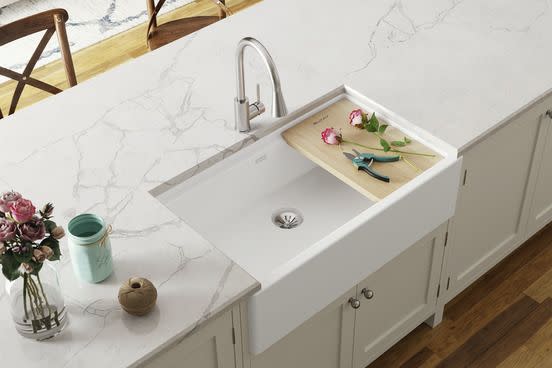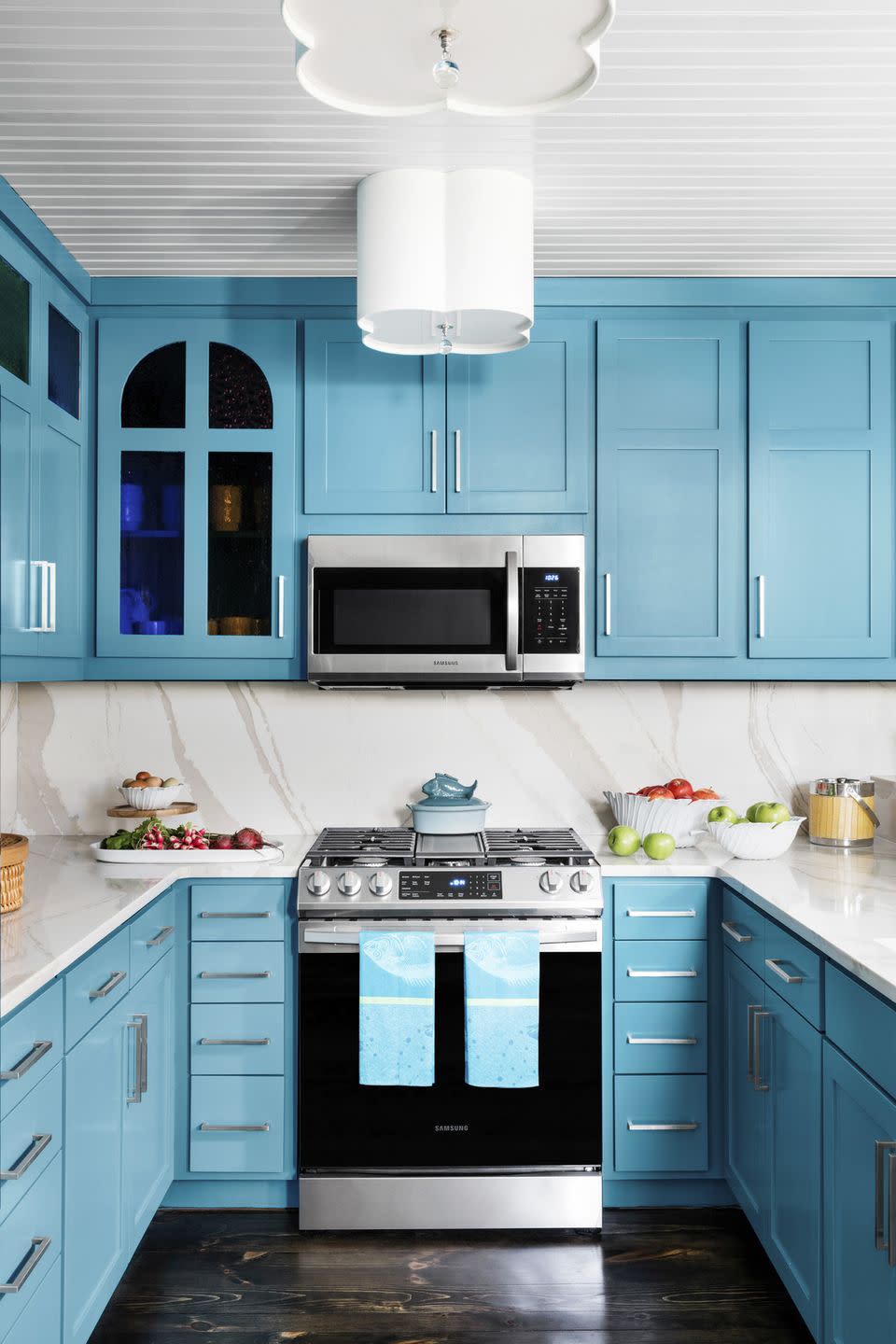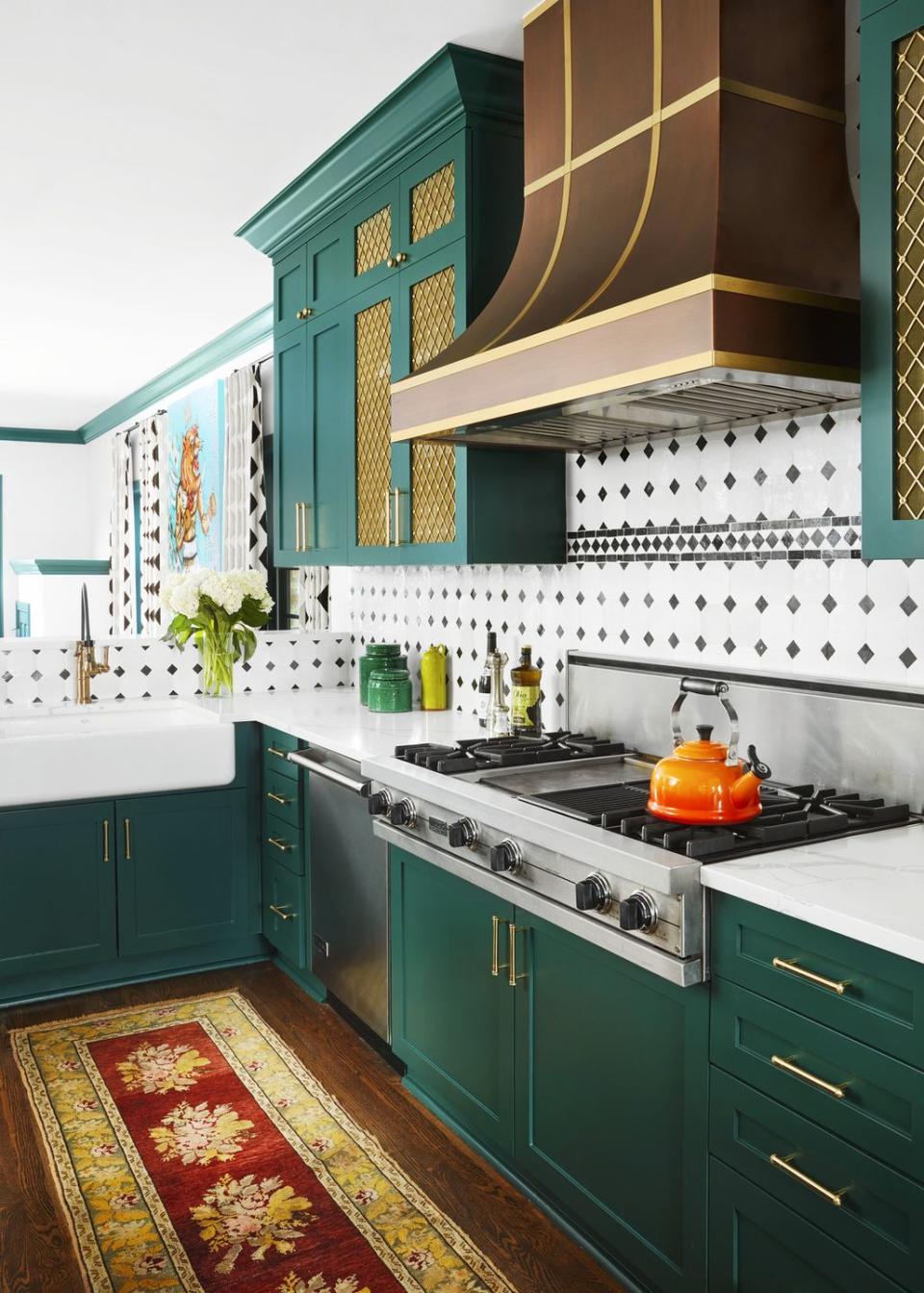This Is the Best Countertop Option for a Bright and Airy Kitchen

Designing a kitchen is a uniquely individual task. Sure, trends and aesthetics come into play, but you also want to make sure that the hub of your home functions in a way that’s best for your family and cooking style. When it comes to selecting a kitchen (or bathroom!) countertop material that is known for both durability and design appeal, no choice ranks higher than white quartz.
What is White Quartz?
Beloved for their versatility and functionality, white quartz countertops (also referred to as engineered quartz) are a timeless way to level up the look of kitchens big and small. Unlike marble and soapstone—which are derived entirely from quarries in nature—white quartz is an engineered stone that combines natural ground quartz (about 90 percent of the product) with resins, pigments, and crushed waste stone (like remnants of marble or granite). The end result is a stunning and sleek surface that has all the appeal of natural stone but boasts added benefits, like a nonporous composition that makes it practically impervious to scratches, dents, bacteria, and stains (aka no more fearing your favorite glass of red will leave a lasting impression in your kitchen).

A word of warning though: The very resins that make white quartz countertops so nonporous and durable also make them sensitive to heat. Translation: Unless you want heat rings on your countertop, always use a trivet!

The History Behind White Quartz Countertops
While white quartz countertops have gained popularity over the past ten years thanks in large part to innovative design leaps, the actual material creation process is nothing new. The development of white quartz surfaces can be traced back to the 1970s when Italian company Breton patented the original combination of quartz and resin—a formulation and patent most modern companies still rely on today. These days, big-name players in the white quartz game (think: brands like Cambria, Caesarstone, MSI, Silestone, and more) are constantly iterating on designs and patterns, incorporating veining and details that make white quartz countertops practically indistinguishable from their pricier natural stone competitors to the untrained eye.
The Benefits of White Quartz
There are many perks to choosing white quartz countertops, chief among them the material’s timeless aesthetic appeal. From all-white kitchens (complete with cloud-like countertops) to dramatic veining that immediately draws the eye, there is an engineered quartz countertop style to suit every interior. Plus, because samples of these manmade countertops are so easy to acquire (and see in person), designers and homeowners alike can easily try out different white quartz countertop samples in their existing space until they land on the perfect style.
How to Choose the Best White Quartz Option
Like natural stone options, white quartz countertops come with a lot of design flexibility and room for customization. The surface can be left polished—which is the typical factory standard—or be honed or leathered to acquire a more matte, natural look. Different countertop thicknesses are also available, though they’re more standardized (often ranging from 1 cm. to 3 cm.) than with traditional stone slabs. Another big perk? The uniformity of the pattern. While many white quartz countertops incorporate the look of veining, these details are standardized from slab to slab, making it easier for designs and fabricators to line up the patterns for a dramatic effect when incorporating high-end design details like a matchbook backsplash or waterfall island.

When it comes to choosing the right white quartz countertop for your kitchen, there are a few factors you’ll want to consider. First and foremost, know that all whites are not made equal. What reads as cloud-like in a showroom may look downright yellow in your own kitchen, so it’s always a good idea to take home as many samples as you can, testing each alongside whatever finishes you’ve already chosen for your space (paint, flooring, cabinets, hardware) and observing their appearance throughout the day. If you’re considering a white quartz countertop with lots of veining or details, try going to a showroom that has the design either as a full slab or installed into a sample kitchen—oftentimes, veining can be hard to gauge off a tiny sample, and you may end up disliking a colorway once you see it larger-scale.
Last—but certainly not least—pricing comes into play. Engineered quartz countertops have gained a reputation as an affordable alternative for homeowners and designers looking for stone-like appeal, and while that’s not necessarily untrue, pricing for white quartz countertops can vary. In general, expect to pay anywhere from $50 to $200 per square foot.
Whether you’re revamping your existing kitchen or building your dream home from scratch, white quartz countertops offer up a combination of style and stability that is simply unmatched.
Follow House Beautiful on Instagram.
You Might Also Like

